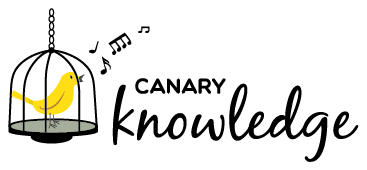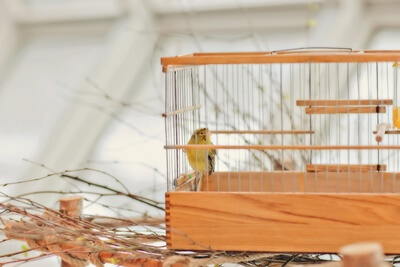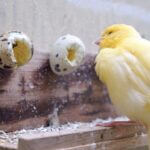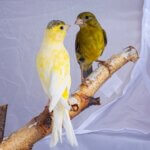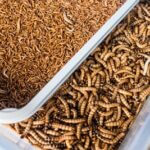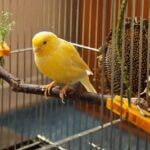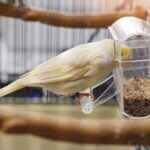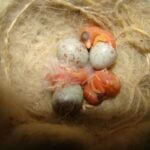Last Updated on: 2nd November 2022, 08:44 pm
You may be familiar with coprophagy in mammals like rabbits but not canaries. After all, canaries don’t produce cecotropes, so eating their poop seems unsanitary and unhealthy.
Canaries only eat their poop when desperate for nutrients, feeling bored or stressed, or kept in dirty cages. By correcting these situations, your canary will no longer engage in coprophagy.
What Is Coprophagia?
Coprophagia is a behavior that involves feeding on excrement. Animals that engage in coprophagia not only eat their feces but will often consume those of other animals, be they a different species or the same.
According to the Journal of Veterinary Medical Science, coprophagy helps some creatures to transfer healthy microbes across generations, thus establishing healthy gut flora.
This is usually the case when the young feed on the excrement of their parents.
Is Coprophagia Healthy?
Some animals use coprophagy to clean their nests, while others consume feces for nutritional reasons. Nonetheless, some cases of coprophagy indicate an underlying physical or mental problem.
In most healthy cases, these animals aren’t consuming their poop but cecotropes. These are concentrated, leftover nutrients that weren’t digested by the body correctly the first time. So, the body passes them on, and the animal eats them again to glean more nutrients.
Rabbits and guinea pigs are known for consuming their cecotropes, but avians, like canaries, don’t produce them. So, birds aren’t designed to eat their poop.
That makes it healthy and harmless if a cecotropes-producing animal feeds on its poop. However, you should pay close attention if your canary starts consuming its waste.
Its motivations could be real and justified, but this is not a healthy practice.
Why Do Canaries Eat Their Poop?
Even if it’s not ideal, many bird species practice coprophagia, including canaries. Your pet canary may be driven to eat its poop for the following reasons:
Nutritional Deficiencies
The most common threat canaries face in captivity is nutritional deficiencies. That’s especially true for young canaries, as their dietary requirements vary based on their life stage.
For instance, a fledgling canary requires a protein-rich diet to ensure it develops properly in its formative weeks and months. In contrast, a grown female canary entering breeding season needs extra calcium to produce healthy eggs.
If your canary lacks the required nutrients, it may eat its poop. This is an attempt to get the nutrients that its body failed to absorb the first time.
Even if it doesn’t produce cecotropes, some nutrients still get leftover in feces, so the canary will be desperate enough to glean all it can.
In particular, canaries that subsist entirely on a seed-based diet will often pass undigested seeds in their droppings. Consequently, they’re prone to Vitamin E deficiencies.
To compensate for the difference, they often eat their poop to take advantage of the leftover seeds.
Boredom
Canaries are curious and intelligent creatures that require physical and mental stimulation to stay healthy.
It’ll dedicate itself to foraging if you don’t provide your canary with toys and space to keep it entertained. This is an effort to keep itself occupied and stave off boredom.
If there’s nothing for your canary to forage, it may eat its feces and anything else available in its environment. This can include feathers, nesting material pieces, and broken toys.
Stress
When a canary is stressed, its metabolism speeds up, and that’s due to its heightened awareness, lack of sleep, and increased heart rate.
This causes it to burn more calories and nutrients at a much faster rate than normal. If the canary can’t compensate for this loss through its diet, it may consume its poop.
Likewise, stressed canaries often excrete water-soluble nutrients like choline, vitamin B, and vitamin C instead of absorbing them.
Since these nutrients are available in the bird’s poop, it may eat its excrement to manage.
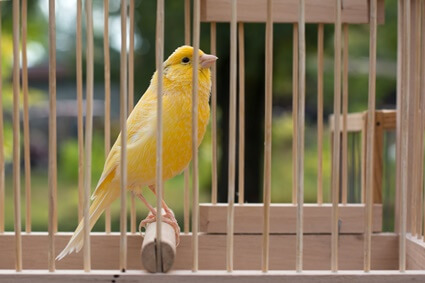
Dirty Cage
Canaries’ cages can get dirty from droppings, spilled water, and leftover food. When a canary finds its cage too unclean, it might try to flick out old and dry poop pellets to clean up its space.
However, if the situation is too dire, your canary might eat poop to make its cage sanitary. This will not be its first choice, and it will often display behavioral issues before this point.
If those are ignored, the canary will have no choice but to clean up as best it can.
Why Do Canaries Eat Their Babies’ Poop?
According to The Wilson Journal of Ornithology, breeding birds will sometimes eat the excrement of their nestlings to recycle nutrients. For example, baby canaries have underdeveloped digestive systems, so they can’t fully digest their food.
Their fecal matter will often contain undigested food particles, which the parent birds will consume to get more nutrients. That’s especially true of the mother, as she may already be deficient in the egg-laying and chick-feeding process.
What Happens If a Canary Eats Its Poop?
Despite being a common behavior in some birds, coprophagia may lead to serious health problems if unresolved. Fresh bird poop is initially hygienic and unlikely to cause any issues, but it can turn into a breeding ground for bacteria and other pathogens in short order.
This may cause your bird to fall sick. The most common bacteria that a canary might be exposed to from eating poop include:
- Salmonella
- Chlamydia psittaci
- E. coli
These are responsible for spreading diseases like:
- Salmonellosis
- Psittacosis
- Respiratory tract infections
Each can be fatal. Therefore, if you notice your canary is suddenly engaging in coprophagy, determine the reason for the behavior and make the necessary adjustments to stop it.
How To Stop Canaries from Eating Poop
The remedy will depend on the core reason for the behavior. However, these steps should help you discourage coprophagia in your canary:
Balance Nutrients
Your canary may resort to coprophagia to compensate for vitamins and minerals lacking in its diet. So, rethink its meal plans.
For instance, if you’ve been feeding your canary a seed-based diet, consider changing it to a pellet diet. This is formulated to provide your canary with all the right nutrients.
You can also supplement this with fresh leafy greens, like lettuce, Swiss greens, and cauliflower, and fruits, like grapes, apricots, raspberries, and bananas.
Providing your canary with a balanced diet will ensure it receives all the nutrients it requires, thus eliminating the urge to feed on poop.
Mental and Physical Stimulation
Canaries are active pets that need constant stimulation to remain happy and healthy. Without that, they can grow bored and irritable, causing them to eat poop.
Provide new toys for your canary and swap out the selection every few weeks, as this will ensure the canary doesn’t grow disinterested in its current toys. Likewise, provide a larger cage or let the canary out for supervised flight time to explore and stretch its muscles.
Clean The Canary’s Cage Regularly
Keeping your canary’s cage sanitary minimizes the risk of infections and reduces the need to eat poop. Set aside time daily to clean your pet canary’s cage and disinfect it.
